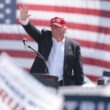Some Democratic Party leaders are investing their hopes for 2018 on voters like Pennsylvania’s Judy Delaney. “I figured the lesser of two evils was Trump,” Delaney told The New York Times recently. “Now I’m second-guessing myself. Because he’s nuts.”
Will simply not being “nuts” be enough to ensure victory for Democratic candidates in November? The results so far are mixed at best. Ralph Northam, a relatively moderate candidate, won the Virginia governor’s race in January. But Jon Ossoff, who ran a bland campaign for a Georgia congressional seat in late 2017, failed even to match Hillary Clinton’s 2016 numbers in his district. Democratic congressional candidate Conor Lamb tempered his Ossoff-like campaign with strong defenses of labor and Social Security. As of this writing, Lamb is essentially locked in a photo-finish following the March 13 special election in Pennsylvania’s 18th Congressional District, a district that went heavily for Trump.
Despite these ambiguous results, the party’s machinery is throwing its weight behind candidates like Lamb and Ossoff. More than 500 progressive leaders and activists, however, including former Labor Secretary Robert Reich, Randi Weingarten of the American Federation of Teachers, Jane Fonda (a staunch Hillaryite in the last presidential cycle), and Michael Brune of the Sierra Club, reflect a different view. They believe that Democrats need to convey more than just hostility to Donald Trump to start winning elections. They’ve signed a new pledge, the Agenda for Good Jobs, Sustainable Prosperity, and Economic Justice, which offers a positive alternative to the Republican and centrist Democratic economic policy agendas.
“We will resist Trump,” the pledge declares, “but resistance is not enough.” The pledge’s signers believe that Democrats can increase their chances by running on a solidly progressive economic agenda. (Disclosure: I am a pledge signer and assisted in its preparation.)
The pledge, which does not address foreign policy or national security issues, includes an 11-point agenda:
1. Jobs for All
The pledge calls for “rebuilding America” by renewing infrastructure, and urges government to ensure a “high-quality job for everyone willing and able to work.” Infrastructure modernization and job creation are seen as potent political issues in “Trump country,” as well as in Democratic strongholds.
Conor Lamb, for example, ran in a district that went for Trump by 22 points. Rick Saccone, Lamb’s opponent, ran a TV ad in that race that misleadingly claimed Saccone supports “$1.5 trillion to rebuild roads and bridges.” (See “Wrong Road for America,” page 1.) According to Gallup pollsters, 75 percent of Americans support more federal spending on infrastructure.
2. Invest in a Green Economy
As well as urgent environmental concerns, job creation is behind the pledge’s commitment to “green economy” investment. Climate change polls especially well among millennials, whose support will be needed for future victories.
Green jobs lead to the adoption of new technologies and increased employment, and it is impossible to outsource the kinds of green jobs that are needed to build an alternate energy grid and retrofit buildings in this country. (Anti-outsourcing legislation can also be written for green manufacturing jobs.)
Seventy-three percent of voters want the United States to place more emphasis on alternative energy, according to Gallup. Another poll showed that 75 percent of Trump voters supported “taking action to accelerate the development and use of clean energy” by funding community upgrades and community renewable projects.
3. Empower Workers to Reduce Inequality
Economic studies have shown a strong correlation between labor union strength and reduced inequality. Conversely, the decades-long private-sector and Republican attack on labor correlates directly with sharply widening inequality across all demographics. With that in mind, pledge signers have committed to “fight for the right of workers to form unions and bargain collectively for better wages and benefits.” The pledge also calls for measures to “curb CEO compensation policies that give executives personal incentives to plunder their own companies,” and for measures to reward firms that pay their workers decently.
Unions are popular with the public. An August 2017 Gallup poll found that support for labor unions was at its highest level since 2003, with 42 percent of Republicans and 81 percent of Democrats expressing approval.
4. Opportunity and Justice for All
The pledge’s agenda also declares that “special attention must be invested in those communities harmed by the legacy of Jim Crow, segregation, discrimination, deindustrialization, and destruction of the public sector,” and that “a fair and humane immigration policy” should be established.
The pledge’s authors reason that a balanced approach to “opportunity for all” must take historical injustices into consideration to achieve a fair outcome.
5. Guarantee Women’s Economic Equality
The same reasoning applies to this plank of the platform, which declares, “We should guarantee that women earn the same pay, protections, and opportunities as men in the workplace and in society, including strengthened laws for reporting and preventing sexual harassment. Women must also be guaranteed affordable health care and the right to make choices about their own health and reproduction.”
6. High-Quality Public Education: Pre-K to University
The pledge reaffirms that access to high-quality education at all levels is a fundamental human right and that teachers must have adequate pay, benefits, and rights on the job.
This plank also calls for canceling all student debt, since tuition-free higher education was once widely available in the United States and will be again if this agenda becomes national policy. This idea gained new credence recently, when the Levy Institute at Bard College released an economic study showing that the cancelation of all student debt in this country would lead to significant growth and the creation of more than one million jobs.
7. Medicare for All—and Shared Economic Security
The pledge declares that “health care is a right, not a privilege” and backs a Medicare for All system. It also proposes creating new pension systems and securing Social Security.
“Greater shared security makes the economy more robust by making our society more fair,” the pledge declares, “and giving all people the confidence that comes from solidarity.”
8. Make Corporations and the Wealthy Pay Their Fair Share
In calling for higher taxes on the wealthy and corporations, the platform affirms its commitment to a policy that has consistently polled well among voters, and which has the support of many liberal economists seeking revenue for critical new government spending programs.
9. A Global Economic Strategy for Working People
The pledge states, “Our global trade and tax policies have been created for and by multinational companies. We must renegotiate trade deals and rethink tax policies that benefit the already-wealthy while they encourage the export of whole American industries, drive down pay and worker protections, and harm the environment. We need more but balanced trade and global standards that protect the rights of workers, consumers, and the environment.”
It proposes a rewrite of current trade agreements, a crackdown on international tax havens, global protections for workers, tougher environmental standards, and “buy American” government policies. The pledge also calls for a shift in military policy to acknowledge the threats posed by climate change, poverty, and inequality. It also calls for cuts to military spending and declares that military intervention should only be used as a last resort.
10. Close Wall Street’s Casino
Voters consistently support stricter regulation of Wall Street. “Substantial majorities of all parties say that Wall Street exerts too much influence in Washington,” according to the latest poll by Americans for Financial Reform, while 78 percent of likely voters agreed that “tough rules and enforcement are needed to prevent the kinds of practices that led to the financial crisis.”
The pledge calls for breaking up the big banks, levying a speculation tax, and introducing affordable public banking services, together with crackdowns on payday lenders and other exploitative bank schemes.
11. Rescue Democracy from Special Interests
Pledge signers have promised to “fight for public financing of elections that bans corporate and big money—and for electoral reforms like public matching of small donations, so people’s candidates can compete with the candidates of the plutocrats.”
The platform also calls for political party reforms that make it easier for “outsider” candidates to run and win. This issue is likely to gain more visibility among Democrats as party leaders debate the rules changes recently proposed by a Unity Commission made up of Hillary Clinton and Bernie Sanders supporters.
These enumerated initiatives are the kinds of reforms rank-and-file Democrats want, according to polling data. In a recent Harvard-Harris poll, 52 percent of Democratic base voters said they supported “movements within the Democratic Party to take it even further to the left and oppose the current Democratic leaders.”
That included 69 percent of voters aged 18 to 34, as well as majorities of female voters (55 percent), Hispanic voters (65 percent), and African-American voters (55 percent).
These findings may help explain the diversity that can be seen among the pledge’s signers. They include Clinton supporters as well as Sanders backers; feminists, civil rights leaders, and economic justice advocates. They include activists Nina Turner, president of the Sanders-affiliated Our Revolution; James Zogby of the Arab American Institute; Rashad Robinson from Color of Change; and Gloria Steinem. Also represented are labor leaders like Larry Cohen, former president of the Communications Workers; Leo Gerard, president of United Steelworkers International; environmentalists Annie Leonard and Bill McKibben; journalist Naomi Klein; and leading economic thinkers like James K. Galbraith and Dean Baker.
Many politicians and observers believe that ideas like these are too far outside the political mainstream. But, surprisingly for many of the skeptics, these proposals often poll well among voters across the political spectrum. Conventional wisdom continues stubbornly to promote a binary view of the electorate, in which Democratic candidates can either mollify Trump voters or energize the party’s left-leaning base but cannot possibly do both.
In the aggregate, this progressive pledge is based on the belief that an economic agenda can unify working voters across racial, geographic, and other dividing lines. One survey showed that 80 percent of Americans live from paycheck to paycheck. Other studies have found that many Americans would be unable to come up with $400 to meet a sudden emergency. Inequality is surging and wages have yet to recover from an extended period of stagnation.
As of this writing, more than 600 people have signed the pledge. Most, if not all, are members of the Democratic Party. But they have signed a statement that reads:
For too long, leaders of both major political parties have allowed the wealthy and the giant corporations to exercise far too much influence over the political decisions that shape American life. Even the party of Franklin Roosevelt has regularly failed to stand up to big money or fight to redress the economic and social calamities suffered by working Americans of all races, ages, and religions.
By signing, these people have aligned themselves with the majorities who told Harvard-Harris pollsters that they wanted to move the party to the left.
“The elites of both parties have failed us,” the pledge declares. “We need a political movement that fights to take back our government from those who have corrupted and subverted it.” It quotes Martin Luther King Jr., who said that “the inseparable twin of racial injustice is economic injustice.”
Anti-Trump sentiment appears to have contributed to a recent string of Democratic wins around the country. In a worrying sign for Democrats, however, a recent Politico–Morning Consult poll showed the generic Republican congressional candidate outpolling a generic Democrat for the first time in nearly a year. Does the answer lie with an agenda like the one outlined in this pledge?
In a telling anecdote from a Washington Post article on the Lamb race, in early March, reporter David Weigel wrote that Lamb declared he won’t support Nancy Pelosi for a leadership role if he’s elected. She is unpopular in the district, supposedly for being too liberal. But a voter interviewed by Weigel misread Lamb’s motives, and his mistake was telling.
“I agree with him,” 65-year-old Bill Luther told the Post’s Weigel. “I’m tired of the establishment Democrats, too.”
Richard Eskow is a writer who primarily covers politics and economics. He is also host and managing editor of The Zero Hour With RJ Eskow, a syndicated radio and TV news and opinion program.
This article appeared in print in the April issue of the Washington Spectator.






0 Comments